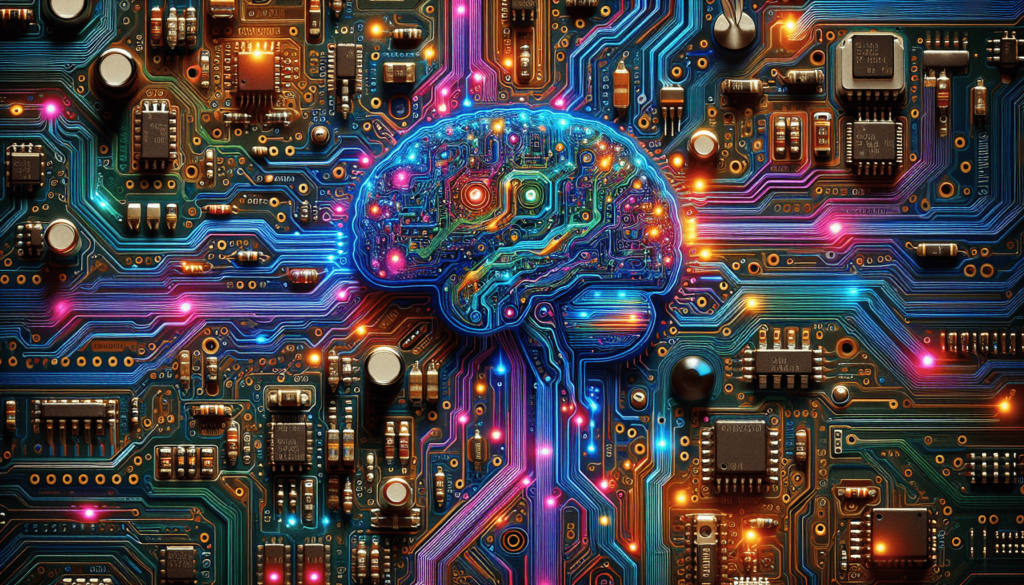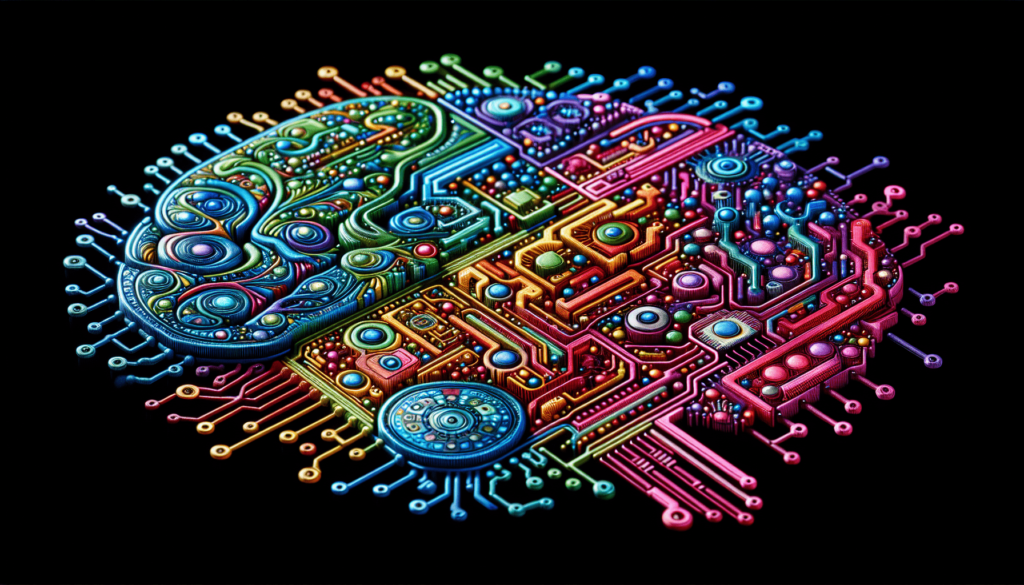In today’s rapidly evolving technological landscape, the question of whether artificial intelligence (AI) can generate truly inventive and groundbreaking ideas and concepts is a topic of considerable interest and debate. With AI technology advancing at an impressive rate, there is growing curiosity about its potential to go beyond mere data analysis and prediction, and actually contribute innovative insights to various fields. This article explores the intriguing possibilities and limitations of AI’s creative capabilities, inviting you to consider the intersection of artificial intelligence and human ingenuity.

Overview
In today’s rapidly advancing world, the role of Artificial Intelligence (AI) in generating innovative ideas and concepts has become a topic of great interest and debate. AI refers to the simulation of human intelligence in machines that are programmed to think and learn like humans. It encompasses various technologies and techniques that enable machines to perform tasks that typically require human intelligence, including idea generation. The potential of AI in this domain lies in its ability to analyze vast amounts of data, learn from patterns, and generate unique ideas that can help drive innovation and progress.
AI in Idea Generation
AI algorithms and machine learning form the backbone of AI’s capability in generating innovative ideas. These algorithms use statistical techniques to analyze and process data, identify patterns, and make predictions or recommendations based on the information at hand. By utilizing vast amounts of data, AI can identify trends, connections, and insights that may have otherwise gone unnoticed by humans. Machine learning algorithms allow AI systems to continuously improve their performance and generate even more innovative ideas over time.
Another critical aspect of AI in idea generation is its natural language processing capabilities. Natural language processing (NLP) is a subfield of AI that focuses on enabling machines to understand and interact with human language in a natural and meaningful way. NLP allows AI systems to analyze written and spoken language, identify key concepts, and generate relevant ideas based on the input received. This capability opens up new avenues for idea generation, as AI can comprehend and interpret language-based data from various sources and generate innovative ideas accordingly.
Potential Benefits of AI in Idea Generation
The integration of AI into the idea generation process holds several potential benefits. One major advantage is the improved efficiency that AI brings to this task. Unlike human beings, AI systems can tirelessly analyze vast amounts of data within a short span of time. This capability allows AI to process more information and generate a broader range of ideas faster than human counterparts. The speed and efficiency of AI-driven idea generation can significantly accelerate the innovation process and enable organizations to stay ahead of the competition.
Furthermore, AI has the potential to enhance creativity in idea generation. By leveraging machine learning algorithms, AI systems can learn from historical data, identify non-obvious patterns and relationships, and generate novel and unique ideas. This ability to think outside the box can lead to breakthrough innovations that humans might have overlooked. Additionally, AI can provide fresh perspectives and alternative viewpoints that can spark creativity and inspire human collaborators in the ideation process.
Access to vast amounts of data is another significant benefit of incorporating AI into idea generation. With the advent of the digital age, an enormous volume of data is being generated every second. AI can analyze this data and extract valuable insights that can fuel innovation. Whether it’s customer feedback, market trends, or scientific research, AI can process and interpret diverse datasets to generate ideas that are grounded in data-driven evidence. The wealth of information available through AI can serve as a valuable resource for individuals and organizations in their quest to generate innovative ideas.
Challenges of AI in Idea Generation
While AI has great potential in idea generation, it also poses certain challenges that need to be addressed. One challenge is the lack of human intuition and context that AI systems currently possess. Although AI can process and analyze data at a remarkable speed, it may struggle to truly understand the underlying context and nuances that humans naturally grasp. Human intuition plays a crucial role in idea generation, as it allows individuals to connect seemingly unrelated concepts and think creatively. AI systems, on the other hand, rely heavily on structured data and algorithms, which may limit their ability to generate truly innovative ideas.
Another challenge arises from the potential bias present in both the data and algorithms used by AI systems. Data bias can occur when AI is trained on biased datasets, leading to skewed results and potentially discriminatory ideas. Additionally, the algorithms themselves may be biased in their decision-making, reflecting the biases of those who develop and train them. To ensure the ethical use of AI in idea generation, it is crucial to address these biases and strive for fairness and inclusivity in the algorithms and data used.
Ethical considerations also come into play when using AI in idea generation. The increased automation and reliance on AI systems may lead to the displacement of human workers in certain industries. While AI can enhance efficiency and generate innovative ideas, it is essential to find a balance that preserves human involvement and creates new opportunities for collaboration and creativity alongside AI. Ensuring ethical practices and responsible use of AI in idea generation can help mitigate these concerns and maximize the positive impacts of AI on innovation.

AI as a Tool for Collaboration
Rather than replacing humans, AI can serve as a valuable tool for collaboration in idea generation. By aiding human creativity, AI can augment and enhance the capabilities of individuals and teams. For example, AI can analyze vast amounts of information and generate a pool of ideas that human collaborators can then refine, evaluate, and build upon. This collaborative approach allows for the best of both worlds, combining the efficiency and data processing power of AI with human intuition, contextual understanding, and creative insight.
Moreover, AI-generated ideas can be combined with human input to create truly innovative solutions. Humans bring a unique set of experiences, emotions, and perspectives to the table, which cannot be replicated by AI systems. By incorporating human feedback and ideas into the AI-generated concepts, organizations can achieve a harmonious blend of technical prowess and human creativity. This collaboration between AI and humans can result in groundbreaking innovations that leverage the strengths of both parties, leading to a more comprehensive and diverse range of ideas.
Real-World Examples
AI-generated art and music have become prominent examples of AI’s creative potential. Artists and musicians have been experimenting with AI algorithms to compose music, generate unique paintings, and produce other forms of artistic expression. AI systems analyze vast archives of music and art to identify patterns, styles, and motifs, and then generate original compositions or artworks in a similar vein. While these AI-generated pieces may not replace human artists and musicians, they demonstrate the ability of AI to generate innovative and captivating ideas in the realm of creative expression.
AI has also made significant contributions to innovation in various industries. For example, in healthcare, AI has been utilized to analyze medical records, research data, and clinical trials to generate insights and ideas for improved treatments and diagnosis. In the automotive industry, AI has been crucial in the development of autonomous vehicles, utilizing complex algorithms and sensor data to generate innovative approaches to transportation. These real-world examples showcase the tangible impact of AI in generating innovative ideas across different sectors.
AI and the Future of Innovation
As AI continues to advance, it holds the potential to augment human creativity and revolutionize the future of innovation. By combining the computational power and data processing capabilities of AI with human intuition and creativity, we can unlock new realms of possibility. AI can assist in the generation of ideas, providing a vast pool of options based on data analysis and learning algorithms. In turn, human collaborators can bring their unique perspective, creative thinking, and contextual understanding to refine and build upon these AI-generated ideas, leading to enhanced innovation.
Moreover, AI has the potential to foster disruptive innovations that can completely reshape industries and societies. By analyzing data, identifying patterns, and making predictions, AI systems can uncover emerging trends and opportunities that humans may have overlooked. This ability to identify and act on disruptive ideas can pave the way for groundbreaking products, services, and solutions. The integration of AI into the innovation process can help businesses stay ahead of the curve, anticipate market changes, and drive positive transformation in various domains.
Ethical Implications of AI in Idea Generation
The rise of AI in idea generation raises ethical concerns that must be carefully addressed. One significant consideration is the ownership of AI-generated ideas. Who should own the ideas generated by AI systems? Should it be the individuals who trained and developed the AI, the organization that employs the AI, or the AI system itself? Clear guidelines and regulations need to be established to ensure fair and ethical practices regarding the ownership and intellectual property rights of AI-generated ideas.
Another ethical implication is the potential job displacement that AI-driven idea generation may cause. As AI becomes more capable of generating innovative ideas, there is a concern that certain job roles may become obsolete. It is crucial to find ways to reskill and upskill individuals to adapt to the evolving job landscape and ensure that AI complements human workers rather than replaces them. Emphasizing the collaboration between AI and humans can create new opportunities and allow individuals to focus on higher-value tasks that require human ingenuity and empathy.
Conclusion
AI has the potential to revolutionize idea generation by enhancing efficiency, fostering creativity, and providing access to vast amounts of data. While AI in idea generation is not without its challenges, such as a lack of human intuition and potential biases, it can serve as a valuable tool for collaboration with humans. The combination of AI-generated ideas with human input can lead to a wealth of innovative solutions and disruptive innovations across various industries.
As AI continues to advance, its role in idea generation is set to become increasingly significant. Augmenting human creativity with AI’s computational power and data analysis capabilities opens up new frontiers for innovation. By harnessing the potential of AI and addressing ethical implications, we can create a future where AI and humans collaborate to generate truly innovative ideas that have the power to shape our world.


Comments are closed